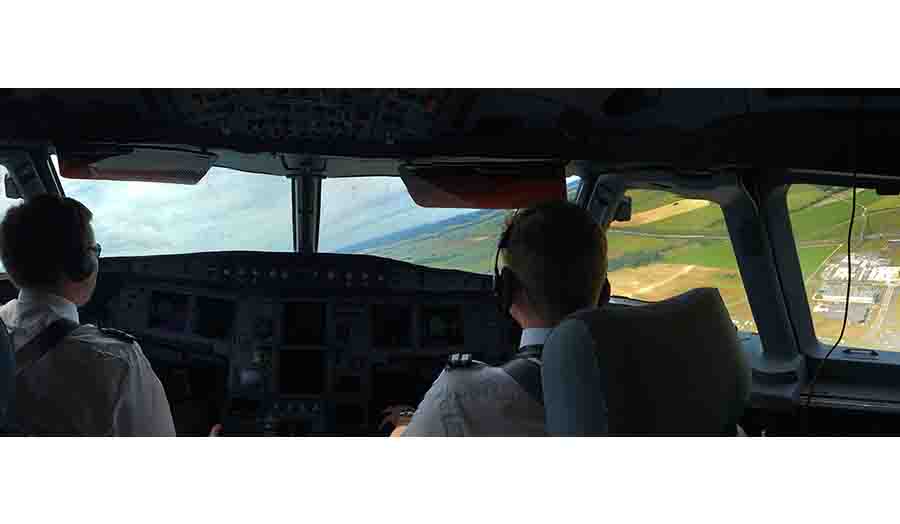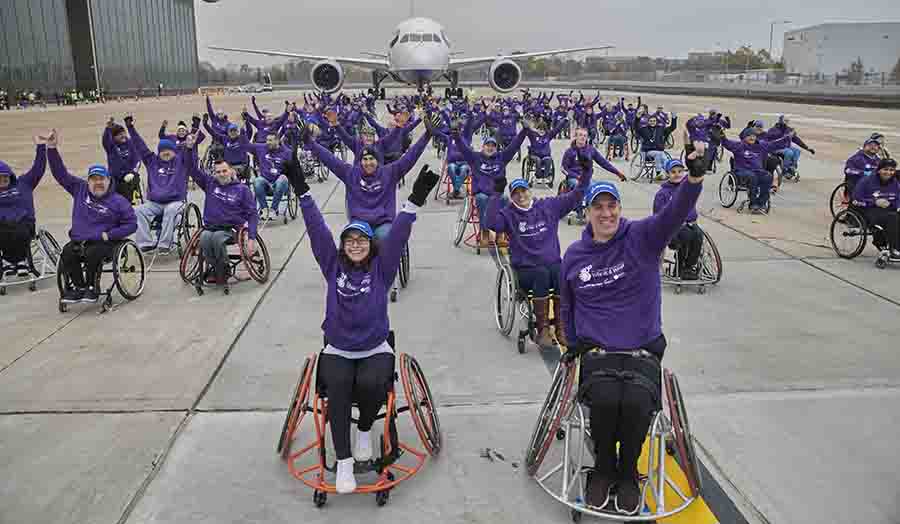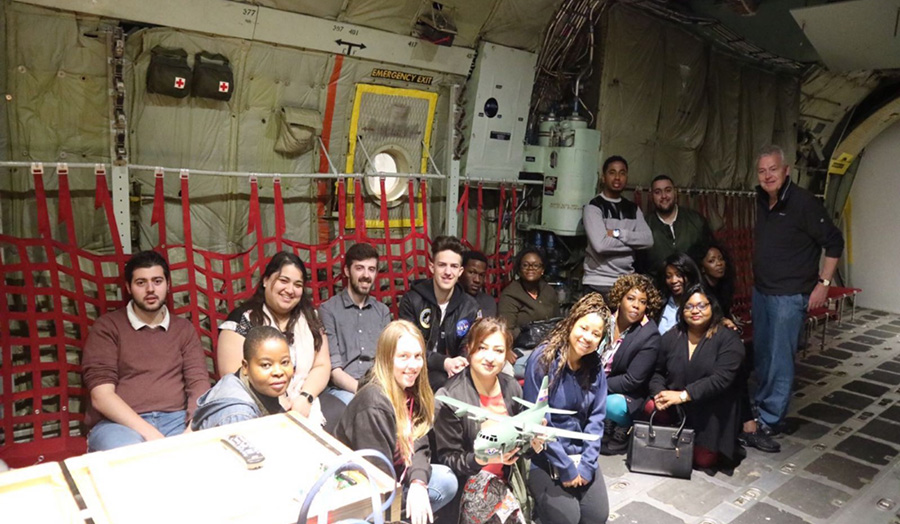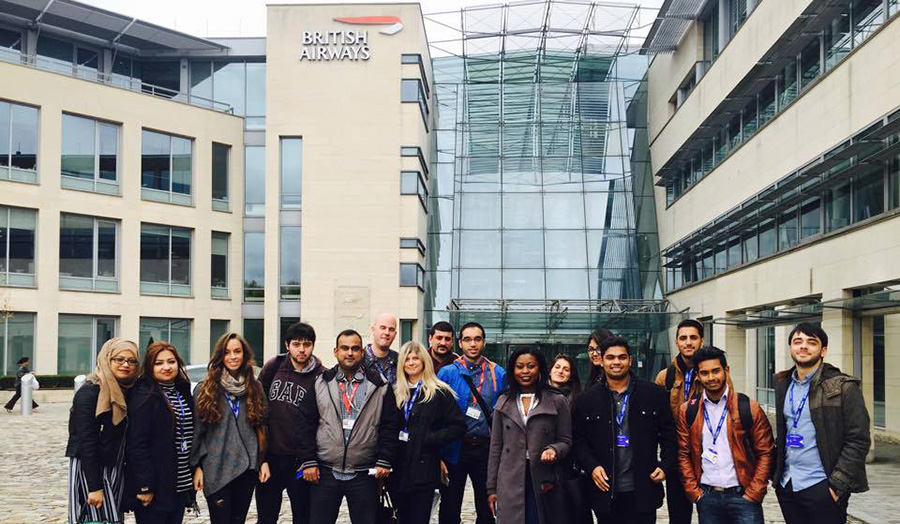Apply for this course
Please select when you would like to start:
If you're a UK applicant wanting to study full-time starting in September, you must apply via UCAS unless otherwise specified. If you're an international applicant wanting to study full-time, you can choose to apply via UCAS or directly to the University.
If you're applying for part-time study, you should apply directly to the University. If you require a Student visa, please be aware that you will not be able to study as a part-time student at undergraduate level.
If you're applying for a degree starting in January/February, you can apply directly to the University.
Apply to us for January 2025
If you're a UK student or an EU student with settled or pre-settled status applying for January 2025, you can simply call our hotline on 0800 032 4441 or complete our fast-track online application form.
Why study this course?
Designed in conjunction with senior aviation managers, our Airline, Airport and Aviation
Management BSc degree course recognises the demand in today’s international aviation
community for graduates with sound business skills and a good understanding of the entire
aviation system. Aviation is an exciting industrial sector that ranges from the technological
excellence of aviation engineering to the management of global airlines and airports.
Learn from industry professionals
Our lecturers have excellent links with members of the aviation community and they’re perfectly placed to offer you career advice specific to the sector
First in the UK for teaching satisfaction
We're ranked first in the UK for satisfaction with teaching on our business and management courses (Guardian University Guide 2024)
Take advantage of studying in London
Our location places us close to the UK headquarters of a number of leading aviation companies and a short distance from all major London airports such as Gatwick, Heathrow, London City, Luton and Stansted
Course modules
The modules listed below are for the academic year 2024/25 and represent the course modules at this time. Modules and module details (including, but not limited to, location and time) are subject to change over time.
Year* 1 modules
Year 2 modules
Year 3 modules
Air Cargo Services and Operations
This module currently runs:spring semester - Monday afternoon
(core, 15 credits)
This module will give an overview of the modern-day cargo industry and its operational challenges and opportunities. The module will focus on how the industry has evolved and who the key players are within it. It will examine trends in existing and emergent markets and the increasing role of technology within the sector. The module will also look at relevant key pricing aspects as they relate to both normal cargo and, abnormal outsize cargo. The Module will also look to study patterns in traffic flows and, a study of topical issues applicable to air cargo managers in today’s turbulent trading environment
The module aims to provide students with:
1. An understanding of the importance and relevance of cargo to the aviation industry in terms of traffic movements, key players and contribution to GDP.
2. Knowledge of how the cargo industry has evolved and, the operational and resource requirements of the sector as we move towards increased technological implementation and electronic documentation.
3. An ability to understand trends, specialist freight movement requirements and market characteristics of the industry
4. To comprehend how costs and prices work within the sector
The module also aims to develop students' skills, in particular: academic study skills; IT; literacy; applied analysis; entrepreneurship, critical thinking; interpersonal and team-working; communication, including oral presentation; and problem solving
Read full detailsAirport Management
This module currently runs:autumn semester - Tuesday morning
(core, 15 credits)
This module will provide an overview of the important functions of airport management for the seamless operation of the aviation system. Airports have a vital role in processing of air passengers and air cargo to ensure that the aviation system functions safely and securely. Airports are complex businesses and have a range of attributes including being land-lords, providing infrastructure (terminals and runways), providing retailing environments, providing the operational environment for airlines. Of course, there are many different types of commercial airports, small (local) airports, regional airports, international airports and global hubs etc.
The focus of this module is management issues facing airport operators and these operators differ in their ownership structures, management structures and regulatory frameworks. It is therefore important to set the ‘management’ of airports in the context of global development of the aviation system and to distinguish airports operating in the ‘private’ sector and those in the ‘state’ sector and various positions in between. The United Kingdom has been particularly dynamic in developing the ‘privatisation sector’ of airports because of decisions made by the Thatcher government to ‘sell off’ state operations very early in the 20th century. As a result, the UK is ahead in many consequences of introducing the profit incentive to improve efficiency of airport operators.
The module aims to provide students with:
1. An understanding of the importance of airports to the economic well-being of regions and countries as vital growth poles and as a result the significance to the country involved.
2. Knowledge of the key features and interfaces for airport ‘management’
3. Understanding of the important performance benchmarks for airports
4. Comprehension of the issues of service quality and the airport passenger experience
5. The need for airports to provide commercial facilities such as retailing environments
6. Airport competition and the role of airport marketing and master planning for development
The module also aims to develop students' skills, in particular: academic study skills; IT; literacy; applied analysis; entrepreneurship, critical thinking; interpersonal and team-working; communication, including oral presentation; and problem solving.
Fundamentals of Airline Management and Operation
This module currently runs:spring semester - Monday morning
(core, 15 credits)
The module introduces fundamentals of Arline Operations, current issues and its applications in the industry. Airline operations present a striking dichotomy. Each day, airlines safely transport millions of passengers around the world. Often, however, they fail to deliver on the ordinary e.g. ground crew turning up late to open doors, loss of bags, millions of pounds in chronically underutilised aircraft etc.
Airlines have not given their operations factory like industrial-engineering scrutiny. A high percentage of an airline’s cost structure consists of maintenance, ground handling, in-flight services, call centres and aircraft acquisitions. At stake, there is an opportunity to reduce overall costs dramatically by using labour, materials and assets more efficiently, to enhance the reliability of service.
This module looks into teaching students the extent of the problems and how airlines are able to solve the problems highlighted above within the regulatory and economic constraints of the industry. Its aim is for students to have a solid background on certification, rules of the air, cost structures, profitability issues and all the necessary complex activities which are required for an aircraft to fly from A to B. The interrelationship between different stakeholders is also explored in this module.
Read full detailsIntroduction to Air Transport Economics
This module currently runs:spring semester - Tuesday morning
(core, 15 credits)
This module serves as a comprehensive exploration and elucidation of the fundamental principles that underpin both micro and macroeconomics, essential for grasping the intricacies of airport and airline operations. Within this framework, the module delves into the analysis of supply and demand, explores the principles governing costs, revenue, and pricing dynamics, and explains concepts related to the productivity and performance of airlines and airports. Additionally, the module will introduce the concept of market failure and look into the economic facets specific to the airline and airport industries, incorporating industry benchmarks crucial for evaluating their overall performance.
The module endeavors to equip students with the following:
A systematic knowledge and profound understanding of both microeconomic and macroeconomic principles, fostering the capability to adeptly apply these concepts within the unique context of the aviation sector.
The ability to discern and differentiate between the diverse costs inherent to airlines and airports, and a keen awareness of how these costs intricately impact overall profitability.
Proficiency in comprehending and manipulating data derived from diverse sources, facilitating the evaluation of sector performance with adequate scrutiny.
Moreover, the module is designed to cultivate a spectrum of essential skills among students, including academic study skills, proficiency in information technology, literacy, applied analytical capabilities, entrepreneurial thinking, critical reasoning, interpersonal and team-working abilities, effective communication (including oral presentation), and adept problem-solving skills.
Read full detailsIntroduction to the Aviation System
This module currently runs:autumn semester - Monday morning
(core, 15 credits)
The module is designed to acquaint students with the concept that the aviation sector functions most effectively when viewed as an intricate system, where various components are interdependent. This interdependence highlights the crucial role played by all stakeholders in ensuring the delivery of high-quality services. The perspective adopted by the Civil Aviation Authority, conceptualizing the aviation industry as a comprehensive 'aviation system,' underscores the involvement of multiple stakeholders. Successful service delivery necessitates each stakeholder's professional commitment.
Within the module, students will delve into the nature of key 'stakeholders' and the collaborative 'system' they operate within. This understanding forms a fundamental link between service management and the aviation sector, shedding light on the essential actors in the industry. From highly technical roles like piloting aircraft to the safety and security responsibilities of cabin crew, and the various tasks in between, aviation encompasses a diverse range of functions. It is imperative for every individual to comprehend their role within the aviation system and recognize the significance of their contribution to its safety and security.
Read full detailsPrinciples of Management (in Aviation Context)
This module currently runs:autumn semester - Tuesday afternoon
(core, 15 credits)
The focus of this module is management and the development of students as managers. Managers are crucial to getting things done, for example, they plan, organise, lead and coordinate the work of others in order to meet organisational goals efficiently and effectively. The challenges of managing in today’s ever-changing, increasingly uncertain, complex economic environment requires managers to have the knowledge, ability and skills to take action, such as managing information, delegating tasks, setting goals, building teams, motivating others and, along with numerous other activities, achieve organisational success.
The traditional view of the purpose and role of management in the world of work was to seek stability and efficiency in a top-down hierarchy aimed at achieving bottom-line results. In contrast, the contemporary management approach expects managers to engage in motivating people and harnessing their creativity, sharing information and power, leading change, and finding shared vision and values in an increasingly diverse and complex workplace.
Today’s managers require the knowledge and ability to draw on both traditional and contemporary approaches to management when formulating workplace decisions. They also need the skills, tools, and techniques to manage their own career trajectory based on the acquisition of sound employability skills and accompanying behaviours.
In addition to knowledge, the module focuses on developing students as managers
which involves the ability to interact with, and motivate, a diverse range of people.
The module aims are to:
- enable students to identify and explain major developments in the history of managerial thought;
- provide students with the opportunity to develop management, leadership and employability capability to enhance their individual potential;
- develop students appreciation of the different management approaches that can be used when managing in uncertain and complex environments;
- enable students to develop their management and employability skills, such as critical thinking and writing, interpersonal skills, self-management, communication, team-working, problem solving, and presentation skills, in order to maximise their competitive edge in the business world.
Principles of Marketing: for Creative Industries and Aviation
This module currently runs:spring semester - Tuesday morning
spring semester - Tuesday afternoon
(core, 15 credits)
The module aims to provide an understanding of the marketing process in contemporary organisations and in the context of tangible goods and services. The service sector accounts for a significant proportion of GDP and employment in most developed economies and therefore it becomes essential for students to gain insight within the area. In this module, students are introduced to a range of marketing theories such as the marketing concept, consumer behaviour, business environmental analysis, marketing research, consumer insights applicable to tangible goods and services marketing.
The module aims to:
● Provide an understanding of the theoretical foundations and practical application of marketing
● Provide an appreciation of contemporary issues in marketing.
● Develop students’ academic writing, application of knowledge and data interpreting skills.
Develop students’ researching and analysing skills.
Understanding and Managing Data
This module currently runs:autumn semester - Monday morning
autumn semester - Monday afternoon
autumn semester - Tuesday morning
autumn semester - Tuesday afternoon
autumn semester - Wednesday morning
autumn semester - Wednesday afternoon
autumn semester - Thursday morning
autumn semester - Thursday afternoon
autumn semester - Friday morning
autumn semester - Friday afternoon
(core, 15 credits)
Data analysis is a top business priority. It drives the opportunity for performance improvement and, with advances in technology and software, data are generated at an ever increasing rate. As such, it is not surprising business data analysis and software skills are among the top graduate skills sought by employers today. Understanding and Managing Data, responds to these market demands by providing the underpinning skills required to make effective use of quantitative and statistical analyses and develops students’ interpretation and reporting skills.
The module introduces data-based decision making and performance measurement and provides students with the practical experience of using Excel to transform data into meaningful information. It further introduces students to forecasting, target setting and project management. As such, it provides students with an understanding of the fundamentals of statistical methods for business decision making. In doing so, it provides the skills and knowledge required for levels 5 and 6 modules, including the dissertation and consultancy project, that develop and evaluate the quantitative aspects of business management.
Overall, this module develops the analytical and communication skills relevant to understanding business information, with an emphasis on problem-solving techniques in the context of business management, decision making and performance measurement.
Airline Commercial Planning
This module currently runs:autumn semester - Tuesday morning
(core, 15 credits)
The module introduces the key themes and understanding for the development of new routes. The importance of route development cannot be underestimated for commercial airlines and is a combination of issues such as the markets available and the ability of the airline to launch operations into the market successfully by understanding the critical factors such as aircraft selection and performance and finance.
- The industry structure and outlook are critical to understanding how airlines assess their market opportunities, so this requires global knowledge of the industry.
- The management of commercial airline operations is the heartbeat of the ability to grow a profitable network and the module introduces an understanding of the specialist functions within the department.
- The steps of route planning process are critically important to the development of profitable route networks and this is central of the commercial airline sustainability.
- Aircraft performance features are again critical to the development of sustainable commercial airline operations and the module will evaluate these features of aircraft.
Airline Revenue and Pricing Management
This module currently runs:spring semester - Tuesday morning
(core, 15 credits)
All successful airlines need to master their market position and technical competencies to ensure success and the management of ‘fares’ is central to this. Pricing and revenue management are at the heart of every airline’s competency and thus of paramount importance. Strategic positions require airlines to understand the competitive environment and the ‘price’ points for both leisure and business travel segments. Pricing and revenue management are therefore critical to survival in the global air travel market.
The module aims to provide students with:
- An understanding of the importance of the ‘pricing’ airline products and balancing revenue against costs
- Development of the pricing strategies and revenue management strategies for different types of airlines business models
- To appreciate the opportunities for new revenue streams from ancillary revenues and the de-bundling of airline products
The module also aims to develop students' skills, in particular: academic study skills; IT; literacy; applied analysis; entrepreneurship, critical thinking; interpersonal and team-working; communication, including oral presentation; and problem solving.
Aviation Psychology and Human Factors
This module currently runs:spring semester - Wednesday afternoon
(core, 15 credits)
Human factors (HF) and our understanding of its effects on safety performance continues to evolve and develop. The human element is vital to the safe and efficient operations of all aspects of the aviation industry. Recently, a better understanding of human behaviour has resulted in significant safety benefits with human factors discipline forming a cornerstone of every aviation safety management programme. This module looks into how an understanding of operational personnel attitudes, behaviours and mental wellbeing can help reduce HF risks to aviation safety.
Another interesting area which explains some of the reasons why operational personnel make errors is Aviation Psychology. Aviation psychology involves the study of human behaviours, actions, cognitive and emotional processes in the aviation field and also investigates the psychological problems encountered in the work place. In this module psychological principles will also be applied to the aviation industry to look into the effects of sleep patterns, central nervous systems, mental functioning etc. on the behaviour and performance of operational personnel.
The module aims to provide students with:
an understanding of elements of aviation psychology and human factors and their application in the aviation industry
knowledge on some of the issues facing crew interaction within the commercial aviation industry
Knowledge to apply models to identify enabling factors which might lead to aviation incidents and accidents
An understanding of factors which affect the mental stability of operational personnel
The module also aims to develop students' skills, in particular: academic study skills; literacy; applied analysis; critical thinking; interpersonal and team-working; communication, including oral presentation; and problem solving.
Risk and Crisis Management
This module currently runs:spring semester - Tuesday afternoon
(core, 15 credits)
The aviation and travel industry has a huge number of interdependent factions within it and this leads to vast operational complexities. This together with a highly regulated industry, a competitive and dynamic external environment and a substantial level of Government involvement has the potential expose this sector and, airlines and airports alike, to a vast array of risks and uncertainties, both internally and externally. Because of the very nature of those risks, there are many uncertainties and disruptive events and this module seeks to understand how to put in place a co-ordinated, effective response that mitigates the effect of such events and minimises harm to an organisation’s stakeholders.
This module will explore the types of risk that the aviation and travel sector are exposed to and, what possible solutions might be put forward to mitigate against these. The module also seeks to understand what crisis management is and how to effectively apply it to the aviation industry.
More specifically the module will help develop the students understanding of how to assess, evaluate, mitigate and monitor risks as they pertain to the sector.
The module aims are as follows;
- to develop students understanding of theoretical modules for risk and crisis management
- to allow students to identify good practice and lessons learnt from both the sector itself and, related industries.
- to build a practical knowledge base of the resource requirements and facilities necessary for airlines, airports and the travel industry to operate as effectively and efficiently as possible in sub optimal business environments
- to enable students to assess risks and develop robust business contingency plans to mitigate against such risks
Safety and Security for Aviation
This module currently runs:autumn semester - Monday afternoon
(core, 15 credits)
The aviation industry has a huge number of interdependent factions within it and this leads to vast operational complexities. This together with a highly regulated industry, a competitive and dynamic external environment and a substantial level of Government involvement has the potential to expose airlines and airports alike, to a vast array of risks and uncertainties, both internally and externally.
This module examines the key aspects of safety and security issues as they pertain to the aviation accidents and incidents including regulations and processes currently employed in the sector. It examines the role of regulators and relevant Government agencies and international organisations in promoting effective safety and security management through the use of Safety Management Systems (SMS) and Security Management Systems (SeMS).
The module aims to provide students with:
an understanding of current best practice that is being promoted by competent regulators and international aviation organisations in enhancing safety and security of the industry.
knowledge and understanding of the systems and procedures used to make commercial flying an exceptionally safe form of transport via an understanding of SMS.
tools that can be used to select and implement techniques for the identification, quantification and management of hazards, threats and risks.
to comprehend how SeMS procedures can be integrated into airport and airline operations.
The module also aims to develop students' skills, in particular: academic study skills; literacy; applied analysis; critical thinking; interpersonal and team-working; communication, including oral presentation and problem solving.
Sustainability, Business and Responsibility
This module currently runs:spring semester - Wednesday morning
spring semester - Wednesday afternoon
(core, 15 credits)
This module will address the critical issue of how current thinking on climate change and sustainability will impact on businesses and organisation. The need to create more sustainable organisations and businesses is fundamental to current and future organisational development strategies. It is necessary for students to understand the growing influence of the sustainability agenda on industry. This influence takes on many forms, from government policies and international agreements to the measuring the impacts of organisational practices on the ecology and communities. In the future, organisations, businesses, communities and individuals will be expected to understand and take responsibility for their economic, environmental and social impacts. This module will examine the current and future challenges. It will equip students to deal with the challenge of creating sustainable forms of business that operate within ecological and socio-economic limits.
It will explore the sustainability context, and how business practices will need to evolve to reflect the realities of operating within a globalised trading system that is striving to apply sustainability principles.
The overarching aim of the module is to ensure that students develop a full understanding of what is meant by sustainability, who decides what constitutes sustainability principles and how these principles are applied. It will explore the varied tools and techniques used to apply sustainability principles, by governments, business and communities, and the challenges and conflicts these present. Such appreciation will be developed progressively via more specific aims which are:
- To engage with the growing international debate and practice around sustainability, business and corporate social responsibility (CSR).
- To evaluate how this will challenge organisations and business.
- To examine tools and techniques for evaluating and implementing of sustainability
- To analyse the evolving policy frameworks within which business operates.
- To understand how changing environmental realities may affect business practice.
The module also aims to assist students in the acquisition of the following skills:
1. Academic reading
2. Researching
3. Problem-solving and decision making
4. Critical thinking and writing
5. Application of knowledge and presenting data
6. Academic writing
Creating a Winning Business 1
This module currently runs:autumn semester - Wednesday morning
autumn semester - Wednesday afternoon
autumn semester - Thursday morning
autumn semester - Thursday afternoon
autumn semester - Friday morning
autumn semester - Friday afternoon
spring semester - Wednesday afternoon
(alternative core, 15 credits)
The University has a policy that undergraduate students must, take a Work Based Learning (WBL) module i.e. a module which requires them to directly experience and operate in the real world of work and to reflect on that episode in order to identify skill and knowledge areas that they need to develop for their career.
This module challenges students to be creative in identifying a new business opportunity and in examining the viability of all aspects of the idea in the real-world context e.g.
- Supporting an existing small business to understand how a business runs
- Respond to small business’s client briefs
- Testing potential customers’ views.
As a result of client brief and feedback, business concepts and/or ideas will develop over the duration of the module.
The QAA Benchmark on Business and Management (2019) emphasises the attribute of “entrepreneurship” and of “the value of real-world learning”. In terms of promoting work related skills, the module specifically focuses on practical techniques for responding to client briefs in evaluating and developing business ideas and so develops creative yet practical thinking.
In addition, it requires students to examine market potential and prepare a presentation of their findings assuming the role of a business consultant. The module requires a high level of self-reliance to explore the business idea based on a client brief. Students develop an understanding of the role of business start-ups, business growth and development.
These skills and techniques are of practical relevance to anyone considering developing a business, working for a Small or Medium sized Enterprise (SME) or taking on an intrapreneurial role within a larger organisation where the business environment is constantly evolving and producing new challenges and opportunities.
Read full detailsLearning through Work
This module currently runs:autumn semester - Wednesday morning
autumn semester - Wednesday afternoon
autumn semester - Thursday morning
autumn semester - Thursday afternoon
autumn semester - Friday morning
autumn semester - Friday afternoon
spring semester - Wednesday morning
spring semester - Wednesday afternoon
(alternative core, 15 credits)
This Work Based Learning module enables students to undertake a short period of professional activity either: part-time/vacation employment; work placement; not-for-profit sector volunteering or a professional/employer led project.
Work Based Learning modules are designed to enhance students’ personal and professional development and assist in preparing students for their future careers. The module aims to facilitate application and progression of knowledge and skills gained via the learner’s studies and wider life experience. Students will be introduced to a range of professional skills and techniques, including: reflective self-assessment; preparation for employment; being a critical employee and developing approaches for co-operative and collaborative working.
• Students will be contacted prior to the semester to provide support in securing work based activity in good time.
• It is a student's responsibility to apply for opportunities and to engage with the Work Based Learning team to assist them.
• The suitability of any opportunities will be assessed by the Module Team and all roles must meet the Health and Safety requirements for Higher Education Work Placements.
• Learners may be able to utilise existing employment, providing they can demonstrate it is personally developmental and involves a relevant level of responsibility.
• In addition, students may be able to complete the Work Based Learning hours during the summer prior to the academic year a student is taking the module.
• Tier 4 International students will be required to submit weekly timesheets for the hours undertaken for the work based learning activity to meet the requirements of their visa. These will need to be signed by their line manager/supervisor.
The module aims to enable students to:
• Effectively express and understand their current skills and abilities in relation to their career values and goals.
• Practically apply the knowledge gained through their course programme to a work environment.
• Gain an in-depth insight of a work environment
• Make a positive contribution to the employing organisation and demonstrate inclusive workplace practice.
• Recognise their personal and professional development learning and apply to their future goals.
Problem Solving: Methods and Analysis
This module currently runs:spring semester - Thursday morning
spring semester - Thursday afternoon
spring semester - Friday morning
spring semester - Friday afternoon
(alternative core, 15 credits)
This module aims to develop students’ ability to understand and apply problem solving methods and analysis in relation to issues that may arise in business and management subject areas.
The module offers an opportunity for students to collect, present, analyse and interpret qualitative and quantitative data from a variety of data sources such as ONS and other sources. It seeks to enhance students’ knowledge and understanding of the business environment and develop their data management and data analysis skills using IT packages as appropriate.
The module provides the quantitative and qualitative data analysis skills that underpin the success of an empirical research project. This module helps to build the sound foundation required to undertake a final year project / dissertation module.
Read full detailsThe Practice of Consultancy
This module currently runs:autumn semester - Monday morning
autumn semester - Monday afternoon
autumn semester - Tuesday morning
autumn semester - Tuesday afternoon
autumn semester - Wednesday morning
autumn semester - Wednesday afternoon
autumn semester - Thursday morning
autumn semester - Thursday afternoon
autumn semester - Friday morning
autumn semester - Friday afternoon
(alternative core, 15 credits)
Consultancy is big business and the sector continues to experience strong growth. The UK consultancy industry alone employs more than 80,000 professionals and is worth an estimated £12 billion per annum; making it the second largest consultancy base in the world.
Management consulting involves engaging with stakeholders to provide objective, specialist advice. It is concerned with diagnosing issues and inefficiencies, solving problems, improving performance and implementing solutions to deliver complex change, maximise growth and to create value for organisations.
The Practice of Consultancy develops the practical research and consultancy skills required for a career in Business Analyses and Management Consultancy and prepares students for the final year Consultancy Project. Specifically, the module introduces research methods for consultancy and aims to develop a practical understanding of the tools and techniques of problem analysis and issue clarification. A range of business frameworks are applied to structure diagnostic analyses and thinking, whilst data, metrics and analytics are evaluated to inform the process and to provide the client with evidence-based solutions. Finally, this module aims to develop students’ communication skills through the preparation of a report to present the outcome of the consultation to their client.
Management consulting covers a broad range of activities and, to be effective, a consultant needs to be client-oriented and solution-focused. Expertise, resourcefulness, an analytical mind, creative thinking, an ability to manage relationships, empathy and excellent communication skills are essential to building trust and ensuring recommendations are implemented. By taking an applied, problem-solving approach, this module encourages students to enhance their competencies in these areas.
Transferable skills
Student will develop a range of key skills and knowledge, including:
- Critical evaluation, problem identification and problem-solving skills
- Research skills (quantitative and qualitative research)
- Numeracy
- Analytic, divergent and creative thinking
- Communication (critical reading, interviewing, listening, negotiating, advising, presenting and report writing skills)
Cultural Tourism Management
This module currently runs:spring semester - Tuesday morning
(option, 15 credits)
International tourist arrivals reached 1.5bn in 2019 and the proportion of these said to be cultural tourists is 40% and rising. Many more are incidental cultural tourists, engaging with culture on a more casual level. Most governments have specific cultural tourism strategies and are looking to develop their cultural tourism offer and find new ways of communicating that to potential visitors. Cultural Tourism Management explores the growth and increasing diversity of this cultural tourism market, and the governance of cultural tourism at different spatial levels from the global to the local. It examines critical issues related to the cultural tourism product including tangible and intangible cultural heritage, contemporary culture, contested meanings, authenticity, identity and the commodification of culture. It identifies the current trends in creative and experiential tourism and how this impacts communities. It considers the ways in which many cities have reinvented themselves as centres of leisure and recreation consumption using cultural infrastructure investment, heritage commodification, events and festivals to boost cultural and creative industry investment and the potential for cultural tourism.
This module is a core for BA Tourism and Travel Management students and an option for BA Events Management, and BA Events and Marketing students. As such it provides an understanding of the key role that tourism plays in the cultural and creative industries, how culture is turned into tourism products and how destinations attempt to package those products for the growing cultural tourism market.
This module aims to:
- Equip students with a basic understanding of the interplay of culture and tourism, the motivations of cultural tourists and trends in their patterns of consumption and the cultural tourism product
- Demonstrate how the arts, museums, galleries, heritage sector, contemporary and local cultures are mobilised for the leisure economy and international tourism
- Increase awareness of the sensitive issues surrounding the commodification of culture
- Provide an understanding of the practical problems of ‘managing’ cultural tourism in dynamic urban and semi-urban contexts
- Develop skills in practical research, observation, creative thinking, fieldwork. recording and communicating findings
Developing Inclusive Organisations
This module currently runs:autumn semester - Monday morning
autumn semester - Monday afternoon
autumn semester - Tuesday morning
autumn semester - Tuesday afternoon
(option, 15 credits)
We live in a more diverse society than ever before. Structural changes in labour markets have led to increasing numbers of women, older workers and disabled people in employment, with fewer younger people in many industrialised economies. Globalisation and migration has also lead to greater ethnic diversity. We are also clear about the business for diverse workforces, and the benefits this can bring to society.
However, there is a question as to whether a diverse workforce always equals inclusion. There is evidence that many of these groups are marginalised and face employment disadvantages in practice. The aim of this module is to illuminate some of the inequalities experienced by these groups, and then to examine theoretical perspectives helping explain these and provide insights into how these can be better remedied in practice.
Whilst arguably the principles of inclusion transcend the protected characteristics (Equality Act, 2010), it is clear that these groups tend to suffer more inequalities in the workplace than others (despite law that protects against this). This module will therefore look at the meaning of inclusion and how it differs from concepts of equality and diversity – what it adds and where it might be lacking. We will examine closely the different dimensions of diversity (gender, age, race/ethnicity and so forth) in order to understand the specific barriers these groups experience, and what methods organisations can develop to ensure more inclusive workplaces – so that everyone feels valued regardless of identity or background.
A broader aim of the module is to provide students with an opportunity to ‘step into the shoes’ of diverse marginalised groups and the specific barriers they face, so they are better prepared to identify and promote inclusive workplaces, as social justice champions of our future. This is something our society needs and London Metropolitan University is passionate about developing – values driven graduates who make a positive contribution to the world (see Strategic Plan).
Read full detailsFundamentals of Project Management
This module currently runs:spring semester - Monday morning
spring semester - Monday afternoon
spring semester - Wednesday morning
spring semester - Wednesday afternoon
spring semester - Thursday morning
spring semester - Thursday afternoon
spring semester - Friday morning
spring semester - Friday afternoon
(option, 15 credits)
Projects come in many shapes and forms, from small to large, familiar to unfamiliar, simple to complex, urgent to non-urgent and widely supported to strongly resisted. Anyone undertaking the sponsorship, governance or management of a project needs to recognise that there are risks to its completion on time, to budget and to the customer’s satisfaction. They should therefore know that it may be unsuccessful in some way, or even fail completely.
It is easy to find examples of such failures; the current Crossrail project, the delayed opening of the Berlin International Airport, the chaos when Heathrow Terminal 5 opened, the government’s failure to meet its targets for Corona Virus testing, and the countless software development projects that have been late, failed to meet user needs or been riddled with bugs.
There are various bodies of knowledge specific to managing Programmes, Projects and Portfolios of Projects that seek to provide the methods and tools to manage projects successfully. These are necessary but not sufficient; they do however go a long way towards improving project success rates. Organisations like the Association for Project Management and the Project Management Institute continue to work to improve the status and competency of project managers, as well as the competency of organisations.
This module introduces students to the role of the project manager, the nature of projects and how to manage them successfully, focusing on the linear project in which the project output is clearly defined at the commencement of the project. Such projects are typical in the construction industry but can be found widely in business organisations. You will also look at the way Agile projects change the approach to project delivery to deal with uncertainty in the product to be delivered and to accept changes in requirements or circumstances.
The module aims to enable students to:
- assess projects to determine the approach most likely to succeed
- contribute to the design and development of effective project organisations that provide governance, assurance, support and direction to the project team
- plan and manage simple projects using both linear and agile methods
- prepare key project documents
- create project plans using project management software including the use of Gantt charts
- communicate project management plans, risks and issues effectively.
International Selling and Negotiation
This module currently runs:autumn semester - Tuesday morning
autumn semester - Tuesday morning
(option, 15 credits)
Selling is an essential function of business. This module provides students with the opportunity to gain and develop essential selling and negotiation knowledges and skills. It will particularly consider the international perspective in selling to prepare the students for the importance of taking into account the richness of our current global context. The module supports the BABM&M course as it supports a marketing management perspective which includes understanding the selling function and learning from it to improve the overall marketing management function. There has been regular research confirming employers’ need for employees with selling skills as they argue that ‘selling is a life-blood of businesses’ since businesses cannot survive without effective results from this important function. Accordingly, the understanding of this business function should give students the edge over other students without such knowledge when seeking employment opportunities. Past students of this module have confirmed the importance of undertaking this module in helping them find a job. Additionally, selling has a broader perspective as it enables students to learn how to be more persuasive while remaining ethical in their business transactions.
Read full detailsAirline and Airport Strategic Management
This module currently runs:autumn semester - Friday morning
(core, 15 credits)
The role of this module is to introduce the role of strategic analysis and planning for airlines and airports to determine a sustainable future for these partners. The module will explore the vital nature of understanding the external environment and the opportunities for growth and development depending on internal capabilities and the external environment.
The module aims to provide students with an:
- understanding of the importance of strategic management opportunities for airlines and airports
- appreciation of the internal factors that allow companies to capitalise on external market opportunities
- understanding of the vital nature of ‘vision’ and ‘mission’ and ‘market’ features for air travel for strategic development
Airport Planning and Development
This module currently runs:spring semester - Friday morning
(core, 15 credits)
The module introduces the key themes and understanding for airport planning and development which is a complex agenda that requires strategic over-sight. Airports are unique businesses that have many stakeholders and uniquely require local support as well as government support to succeed. They also have a unique relationship with airlines as they are symbiotic operators with airlines. The module aims to provide students with:
- An understanding of the context for airport planning and development
- The role of master planning and reasons for this process
- The importance of stakeholders in the aviation airport planning process
Brand Management in Aviation
This module currently runs:spring semester - Thursday morning
(core, 15 credits)
This module provides a comprehensive and up-to-date understanding on brands, brand equity and strategic brand management. It outlines the concepts and framework of branding, which are crucial in designing, implementing marketing campaigns as well as activities to build, measure and manage brand equity. It provides students with the tools and techniques to improve long-term profitability via creating effective brand strategies.
Aims of the module:
- Explore the role of branding from a corporate and consumer perspective.
- Examine the theory of branding.
- Develop students' understanding of the role played by marketing communications in the building and maintenance of brands in the Aviation industry.
- Develop students’ researching and analysing skills.
- Develop students’ critical writing, application of knowledge and decision-making skills.
Financial decision - Making in context for Aviation
This module currently runs:autumn semester - Thursday morning
(core, 15 credits)
Financial decision-making is important for any and every business. This natural mental process needs to be informed to select a course of action from several alternative options. One of the most essential elements that help to facilitate the implementation of the business strategy in an organisation is Finance. The financial manager of an organisation plays a central role in making decisions on optimum utilisation of financial resources and assess the implications for shareholders and other stakeholders, and the need for effective corporate governance. Therefore, managers require critical understanding of key financial management issues, aviation performance indicators and methodologies relating to financial management frameworks. Managers use these tools when they are faced with making financial decisions in the aviation business environment. This module provides students with knowledge about financial decision-making approaches and control systems aviation businesses use to make managerial decisions.
The module also provides the knowledge and skills necessary to evaluate the impact of financial decisions. It enables learners of today, who are managers of tomorrow, to participate in decision making processes concerning the utilisation of finances in investment, financial and risk management, and the delivery of value for money in achieving the objectives of the business. Although managers are not always required to perform detailed financial analysis, they need to have a clear understanding of how the process of financial management and decision-making work to ascertain that decisions are properly made and implemented and that apposite risk management systems are in place.
The module focuses on fundamentals of aviation financial management, the need for accounting and finance, financial governance, making capital investment decisions, balancing risk and return, tools of financial analysis, interpretations and planning, reading financial reports, cost challenges in decision making, working capital management, sources of finance, cost- passenger volume-profit analysis and its use in managerial decisions and planning.
Leading Innovation in the Aviation Industry
This module currently runs:autumn semester - Thursday afternoon
(core, 15 credits)
This final-year core module “Leading Innovation in the Aviation Industry” aims to enable students to study and apply in practice:
- a range of leadership theories and techniques to critically evaluate and develop their own personal leadership style relevant to the industry
- a range of leadership theories and techniques to critically evaluate contemporary innovation practice, and organisations in a range of industries engaged with innovation practice in the Aviation industry
- a range of innovation theories and techniques to critically evaluate contemporary innovation processes, and organisations in the Aviation industry
- the synergies between leadership and innovation in the context of the Aviation industry.
The Module will be based around two themes:
(i) Theme 1: Leadership, where they will study, reflect on, and use leadership theories and techniques to assess and develop their own personal leadership style. By doing this, students will be closely engaging with and evaluating classic and contemporary theories, and directly applying the ideas from these theories to their own experience and ambitions in general and the Aviation industry in particular.
(ii) Theme 2: Innovation, where they will study, analyse, and evaluate the innovation processes of selected organisations and industries (by critiquing, for example, Case Studies), and how innovation is achieved and operates within the contemporary economy (by critiquing, for example, classic and contemporary examples). In addition, students will study the synergies between leadership and innovation, an emerging area in academic research and in practice. By doing this, students will be closely engaging with and evaluating innovation practice and performance, informed by the leadership theories and techniques covered in Theme 1.
Each theme will conclude with an assignment: Theme 1 will conclude with a team-based formative assignment, and Theme 2 will conclude with a pairs-based summative assignment. Once complete, this Module aims to enable students to understand a long-term time line. Firstly, students will ‘look back’ and be exposed to classic and contemporary leadership texts, so they can critically evaluate and develop their own personal leadership style. Secondly, they will ‘look forward’ and critically evaluate how innovation can further emerge in the economy and society, and how contemporary and future organisations and industries can ensure sustainability through enhanced innovation, blended with enhanced organisational leadership.
Read full detailsConsultancy Project
This module currently runs:all year (September start) - Monday morning
all year (September start) - Monday afternoon
all year (September start) - Tuesday morning
all year (September start) - Tuesday afternoon
all year (September start) - Wednesday morning
(alternative core, 30 credits)
The Professional Consultancy / Project is a capstone module in which students will be required to undertake a business project aimed at enhancing their employability as well as providing a platform for further professional development.
This module requires students to undertake and write up an individual project that gives them the opportunity to not only consolidate their learning on the programme, but also to clearly apply their learning in a real-world context. Furthermore, it will provide students with the opportunity to showcase their professional competences built throughout the programme.
If in employment students may choose to use a work-based consultancy project (subject to agreement from their employer). Alternatively, they may choose a project which is research-based.
Students will also be required to present their project via an on-line presentation or podcast. This module gives them the opportunity to demonstrate their professional credibility and to use their academic, business and technical skills in a professional context.
Professional Consultancy Project aims to:
1 Demonstrate the ability to utilise and contextualise knowledge by applying analytical skills to a business situation or problem
2 Demonstrate the ability to assemble a coherent and a sustained piece of writing that evaluates a business/project problem/solution
3 Create an opportunity to further develop a range of skills associated with research including analysis, interpretation, written expression, formal report writing, and self-managed study
4 Engage students on a complex, integrated activity that will consolidate and integrate previous skills and learning
5 Provide students with a ‘showcase’ opportunity that allows them to demonstrate their ability to apply the knowledge and skills acquired throughout the course to a significant and specialised task
Dissertation
This module currently runs:all year (September start) - Tuesday morning
all year (September start) - Tuesday afternoon
(alternative core, 30 credits)
This module aims to enable students to complete a research focused dissertation on a chosen topic or issue appropriate to their undergraduate degree. Students are required to reflect on relevant research questions, theoretical concepts/hypotheses, prior literature, ethical approaches, research methodologies and data analyses in an independent and disciplined manner. Students are expected to develop an in-depth understanding of their chosen research topics, research methods/approaches and the ability to appropriately seek out data samples required for research in a selected topic. The module aims to develop analytical, critical thinking, referencing and time management skills in independently undertaking and reporting on a research project.
Read full detailsPersonal Finance
This module currently runs:spring semester - Wednesday afternoon
(option, 15 credits)
This module has been nationally promoted by the UK financial regulator the Financial Services Authority (FSA), [now Financial Conduct Authority (FCA)], as a ‘unique idea’ in their ‘National Strategy for Financial Capability in Higher Education’ (2009), and disseminated to all universities as an exemplar for raising student interest, expertise and enthusiasm in personal finance. FSA refers to London Metropolitan University as one of only four universities awarded the FSA Curriculum Development Grant for “unique ideas” put forward for the creation of a financial capability module, the unique idea for this University being the innovative Competency Based Action Learning (CoBAL) curriculum which is the outcome of doctoral level research conducted in collaboration with real-world organisations such as the National Institute of Adult Continuing Education (NIACE), the FSA, and the National Research and Development Centre for adult literacy and numeracy (NRDC).
The module underlines the role personal judgement plays in personal finance, and the many perspectives that inform personal judgement, enabling the student to formulate and employ Action Learning strategies for the development of knowledge, skill and attitudinal competencies in personal finance, and for increased ability and confidence in dealing with the complexities of making financial decisions in the five domains of financial capability identified by the FSA.
This is an Extension of Knowledge (EoK) module which any student on any course in the University is able to take as an option module subject to their course incorporating a relevant slot in their course structure. The module’s EOK status recognises the need for students of all subjects to have a good grasp of Personal Finance.
Read full detailsService Excellence for Creative industries
This module currently runs:spring semester - Tuesday morning
(option, 15 credits)
‘Service Excellence for Creative Industries and Aviation’ investigates practices and strategies used in managing exceptional relationships between customers and service providers. Consistent delivery of high-quality service increases customer loyalty, businesses reputation and competitive advantage, hence the module focus lies in the exploration of all aspects of excellent service delivery.
The aim of the module is to provide students with understanding of the importance of service excellence, including reflection on their own professional conduct practices, and equip them with analytical ability to assess and improve service delivery.
Read full details
.jpg)



















